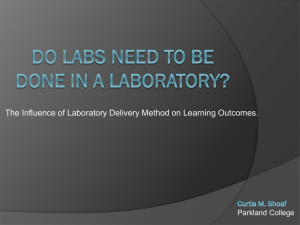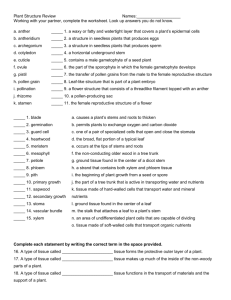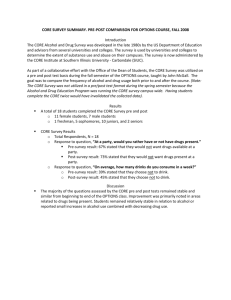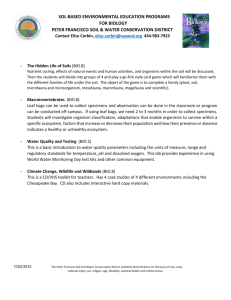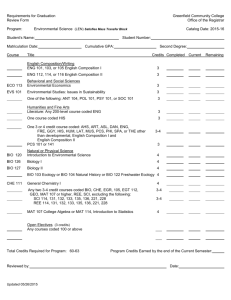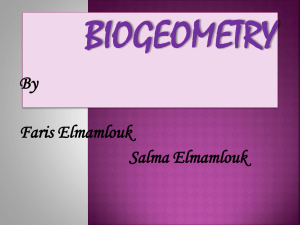3. Plant Evolution and Parts Notes
advertisement
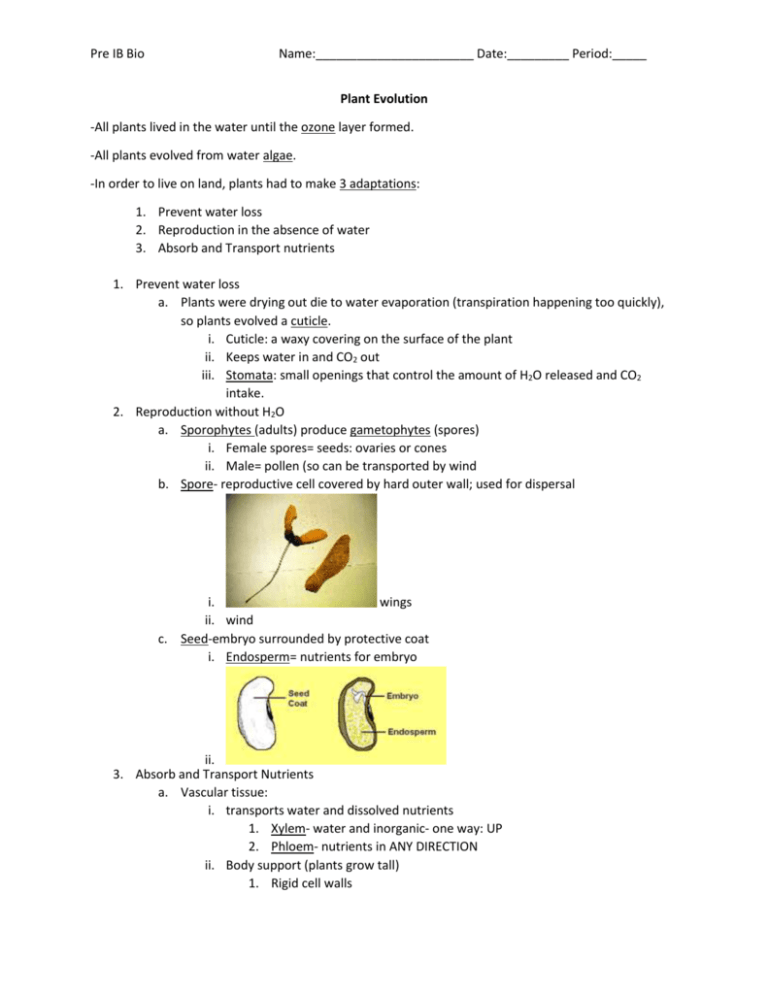
Pre IB Bio Name:_______________________ Date:_________ Period:_____ Plant Evolution -All plants lived in the water until the ozone layer formed. -All plants evolved from water algae. -In order to live on land, plants had to make 3 adaptations: 1. Prevent water loss 2. Reproduction in the absence of water 3. Absorb and Transport nutrients 1. Prevent water loss a. Plants were drying out die to water evaporation (transpiration happening too quickly), so plants evolved a cuticle. i. Cuticle: a waxy covering on the surface of the plant ii. Keeps water in and CO2 out iii. Stomata: small openings that control the amount of H2O released and CO2 intake. 2. Reproduction without H2O a. Sporophytes (adults) produce gametophytes (spores) i. Female spores= seeds: ovaries or cones ii. Male= pollen (so can be transported by wind b. Spore- reproductive cell covered by hard outer wall; used for dispersal i. wings ii. wind c. Seed-embryo surrounded by protective coat i. Endosperm= nutrients for embryo ii. 3. Absorb and Transport Nutrients a. Vascular tissue: i. transports water and dissolved nutrients 1. Xylem- water and inorganic- one way: UP 2. Phloem- nutrients in ANY DIRECTION ii. Body support (plants grow tall) 1. Rigid cell walls Pre IB Bio Name:_______________________ Date:_________ Period:_____ Classifying Plants 12 phyla divided by: 1. Nonvascular plants- no vascular tissue, roots, stems, leaves 2. Vascular plants-vascular tissue, true roots, stems, leaves a. Seedless: ferns b. Seeds: gymnosperms, angiosperms i. Gymnosperms- seeds not enclosed in fruits (ex: pine tree) ii. Angiosperms- flowering plants; seeds in protective fruit Plant Life Cycles 2 stages 1. Diploid (2n) sporophyte that will produce spores (adult form that you can see) a. Diploid= has an entire set of chromosomes (one half set of chromosomes came from female egg and the second half set came from male sperm) 2. Haploid (n) gametophyte that produces egg and sperm a. Haploid= half the number of chromosomes (ex: eggs have a half set of chromosomes, because the egg will later combine with a sperm which provides the embryo with the other half set of chromosomes) b. Pre IB Bio Name:_______________________ Date:_________ Period:_____ Types of plants: Phylum Bryophyte common Mosses, liverworts, hornworts picture characteristics Seedless No vascular tissue, so small Need water for sexual reproduction Alternation of generations life cycle Pteridophyte Ferns Horsetails mosses Seedless No roots spores Gymnosperms Cycads Gingkoes conifers Naked seeds cones Angiosperms Flowers and fruits seeds flowers and fruits Pre IB Bio Name:_______________________ Date:_________ Period:_____ Structures and Tissues: Plant Organs General Info Roots -Found at below the surface in the soil -anchors plant -absorb water and nutrients Stems Structure, transport -node: where leaf attaches to stem Leaves -Appendage of stem in vascular plants Flowers Brightly colored to attract pollinators Physiological Process: Photosynthesis, Cellular Respiration, Transpiration, Growth, Reproduction Pre IB Bio Name:_______________________ Date:_________ Period:_____ Fruits Cones Plant Tissues Meristematic -Regions where cell continually divides. -Plant “stem” cells -Found mostly in roots and leaves (fast growing areas) Dermal -outside covering of plants -epidermis made of parenchymal cells Ground (see pic above) - surrounded by dermal tissue -storage, metabolism. Support -most common -surrounded by ground tissue -transport and support -xylem and phloem Vascular Pre IB Bio Name:_______________________ Date:_________ Period:_____ Plant Structures Cambium -secondary growth -contributes to “thickness” Guard cells -border stomata Phloem -organic and inorganic -NUTRIENTS Root Hairs -increase surface area of root=absorb more water and nutrients Root Cap -Protective coat -lubricating oil Pre IB Bio Name:_______________________ Date:_________ Period:_____ Seed -plant embryo surrounded by protective coat Stomata -open and close for CO2 and H2O Xylem -water transport -inorganic material transport Stamen -male reproductive organ Pistil - female reproductive organ Petals -brightly colored Pre IB Bio Name:_______________________ Date:_________ Period:_____ -attract pollinators Ovary -ripened fruit Sperm -in pollen Egg -develops in ovule Sepal -protects flower before Pre IB Bio Name:_______________________ Date:_________ Period:_____ opening -“bud” Filament - supports anther Anther (see pic above) Style -holds pollen Stigma See pic above -pollen receptor -tube pollen travels down Pre IB Bio Name:_______________________ Date:_________ Period:_____ Pre IB Bio Name:_______________________ Date:_________ Period:_____
